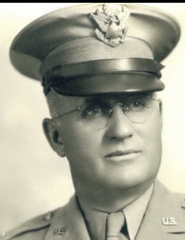Axis Nations Find Cost of War Is High
By Frank Miles
(Iowa Daily News War Correspondent)
In the Field with the First Army (IDPA) -- If the people living in the sections of Germany and Italy, which have been forcibly occupied by American and Allied forces, could have foreseen the devastation they might have protested vigorously against their crazy dictators plunging the world into war.
This thought struck me when I came into Germany and compared conditions here with what they were in Italy. Neither words not pictures can portray adequately the scenes in either country resultant from the bombings and shellings necessary to break the Hitler-Mussolini threat to human freedom all over the globe.
The destruction they wrought when they were seizing other nations and that which has been inflicted in driving the nazis back toward Berlin and knocking Mussolini out is bad enough but infinitely worse is the cost in lives and suffering to the men and boys under the United Nations flags.
In Aachen, which is mass of debris from bombed and shelled buildings, four front line GIs whom I met at a Red Cross doughnut stand, grew serious as we discussed the effects of of the war.
"How thankful I am that no place in my home state of Connecticut has been hit like this one has," one said. "And I hope and pray that 25 years from now American boys won't have to do a job abroad like we are doing."
"Our country must unite with those who want peace and keep gangsters from getting strong again," a Texan commented.
"It's tough to have to kill but we can do it to save America," added a Georgian. "A buddy who blew up a group of Germans to pieces with a hand grenade wrote a book on religion before he was inducted into the army. He said he knew a better way to settle troubles but not now."
This made me think of a story of Lt. Charles W. Fleisher, Indianaola, who is in the 91st division of the first army in Italy.
For two days he and his a platoon were in intense combat. As they moved along a hillside German machine guns fired upon them. The Americans responded with grenades, then the lieutenant rushed the enemy position. He shot one jerry with his last round of ammunition. When his carbine failed to fire again he seized it by the barrel and using it as a club, swung and crushed a jerry's head.
Staff Sgt. Thomas Green, of the 91st, narrowly escaped death or serious injury when just as he passed a house a tremendous blast blew it into rubble. His home is in Pocahontas.
Along with the fighting, there must be much hard work.
Cpl. John A Myers, Jr, Adel, an engineer of the first army, has the arduous job of keeping a vital supply route free from ice and snow. Often he was under enemy artillery but with a corps of wrecker drivers, radio operators and medical aid men performed his duties well enough to draw commendation from his officers.
There is another side to army life.
Pfc. Clyde M. Lee, Forest City, organized a choir of men of the 4th division that sings regularly during chapel services at the rear echelon and in special programs such as those staged at intervals in hospitals.
Major Lloyd Shepherd, Des Moines, after 36 months overseas with the 34th is en route home on furlough. He commanded a front line medical clearing station. Between the beginning of the North African campaign and the major's departure, his battalion cleared more than 57,000 patients.
Cpl. Budd C. Yargus, Bloomfield, a combat engineer, and Pvt. William E. Starr, Moulton, of the 34th, were going home under the army rotation plan. Starr won the Bronze Star for heroic achievement in action at the Anzio beachhead and wears the combat infantryman badge and the Europe theater ribbon with four stars.
"Iowa Ink" was painted on the hood of a truck driven by a Negro soldier I saw in Belgium recently.
Scores of Belgian children held up their hands as we drove along. One group shouted in glee when we gave them chewing gum.
Source: Carroll Daily Times Herald, April 20, 1945
![]()

